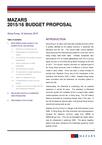Mazars submits its proposals for the 2015 / 2016 Hong Kong budget
Introduction
Hong Kong is an open and externally oriented economy which is greatly affected by the global economy in particular the Mainland and the US. The overall trade volume between Hong Kong and the Mainland accounted for more than half of Hong Kong’s total trade value. Chinese companies also accounted for 57% of market capitalisation and 72% of annual equity turnover on the Hong Kong Stock Exchange at the end of 2013. The tourism industry has been an important part of the Hong Kong economy since it shifted to a service sector model in early 1990s. There has been a sharp increase of tourists from Mainland China, due to the introduction of the Individual Visit Scheme (IVS) in 2003. Despite Hong Kong’s close connection with the Mainland, its monetary system is tied to the US.
Unfortunately, the Mainland is contending with its weakest expansion in almost 30 years. The slowdown of Mainland economic growth will inevitably hit the re-export trade, capital market activities, tourism etc. in Hong Kong. The US Federal Reserve forecasts for increasing interest rates in this year. If the US increases its interest rates, it will prompt Hong Kong to raise its borrowing costs as well.
Globally, the Euro Zone is in danger of its third recession since 2008. In Hong Kong, the Chief Executive has just proposed to increase the statutory minimum wage from HK$30 to HK$32.50 per hour. This can be translated into higher labour cost for enterprises in particular SME. The above negative factors have been echoed by the challenges posed by recent political unrest.
With all these threats and uncertainties, 2015 will be a challenging year for Hong Kong businesses. Mazars Hong Kong believes that tax measures should be introduced to sustain Hong Kong’s competitive advantage and to provide an optimal business environment, which in turn will help stimulating Hong Kong’s economic growth.
Hong Kong people are facing very high cost of living pressures. The government has already terminated its subsidies on electricity bills and rates demand notes since July 2014. Prices in every aspect of living have been rising. These coupled with the possible increase in mortgage loan interest added pressures to Hong Kong families on their high cost-of-living. Mazars Hong Kong recommends that budgetary measures should also be introduced to relieve people’s hardship and improve quality of life.
“Population ageing” is a pervasive, profound and enduring tide sweeping across the world and Hong Kong is no exception. To encourage Hong Kong people to prepare for retirement and utilize private healthcare services, Mazars Hong Kong recommends the government to introduce tax incentives.
Our recommendations are focused on tax measures and can be classified into three headings:-
- Restoring Hong Kong’s tax competitive advantage;
- Relieving people’s hardship and pressures; and
- Preparing for the future.
Table of contents
1. RESTORING HONG KONG'S TAX COMPETITIVE ADVANTAGE
- Reduction of corporate tax rate
- Modernization of current tax loss regime
- Tax incentives for activities of regional headquarters
- 200% tax deduction for R&D expenditure
- Two-tier profits tax system
- Tax deduction for capital expenditure on plant and machinery
- Status of a statement of loss
- A comprehensive review of our tax system
- A review of our tax law to align with the New Companies Ordinance
2. RELIEVING PEOPLE'S HARDSHIP AND PRESSURES
3. PREPARING FOR FUTURE

